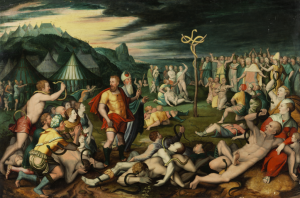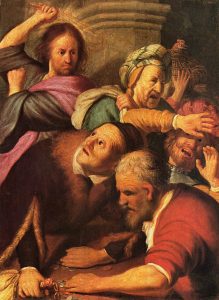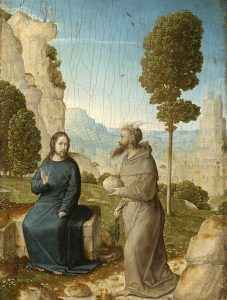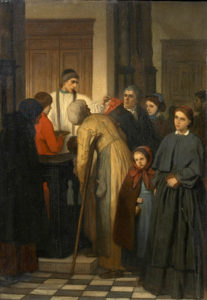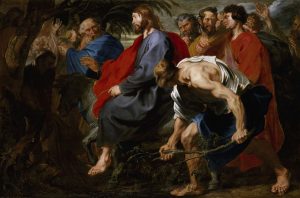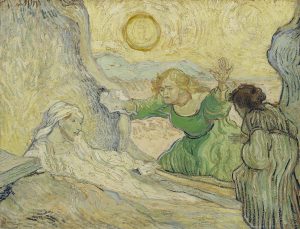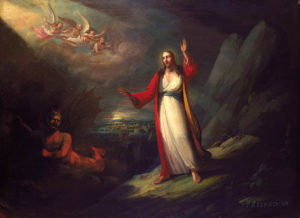Thoughts on Sunday’s Lessons for March 28, 2021
Liturgy of the Palms B
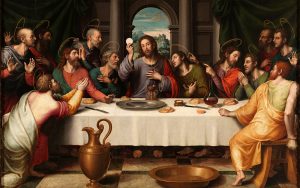
The Last Supper (c.1560), oil painting on panel by Juan de Juanes (1523-1579). Museo del Prado, Madrid. (Click image to enlarge.)
Psalm: Psalm 118:1-2, 19-29
As we sing this ancient hymn of celebration and praise, traditionally titled “A Song of Victory,” imagine a joyous crowd approaching the Temple, clapping hands and singing out as they celebrate the Lord their God, whose steadfast love endures forever. Its words of joyous praise for God’s works and mercy foreshadow the words we sing in the Great Thanksgiving as our Eucharistic Prayer begins: “Blessed is the one who comes in the name of the Lord! … Hosanna in the highest.”
Gospel: Mark 11:1-11
Palm Sunday and Passion Sunday were once celebrated on separate Sundays, but the celebrations were brought together in the time of ecumenism that followed Vatican II. As a result, we take a quick and startling turn in the course of one Sunday’s worship. First we hear of Jesus’ triumphal entry into Jerusalem, riding a donkey and greeted as a King by throngs spreading their cloaks and leafy branches in his way, shouting “Hosanna!” But then, later in the liturgy, we undergo a dramatic change of tone when we hear those same crowds angrily shout “Crucify him!” This contrast sets a tone for Holy Week as we follow Jesus to the cross: God is with us in joy. God is with us in sorrow.
Alternate Gospel: John 12:12-16
All four Gospels tell of Jesus’ triumphant entry into Jerusalem, riding a modest mount and hearing the acclaim of crowds; as is always the case, each Gospel narrative tells a slightly different story. John’s version, for example, is the only one that explicitly declares Jesus the King of Israel, and the only one that tells us the disciples did not understand what was going on. But all four versions share the triumphantly waving branches – here explicitly described as palms – and the joyous shouts of Hosanna.
Liturgy of the Passion B
First Reading: Isaiah 50:4-9a
These familiar verses from Isaiah introduce us to the suffering servant. Written about the people in exile in Babylon, it prophesies a servant leader who who would receive the enemy’s blows for the people in exile, and eventually guide them back home. While we respect the original intent, Christian readers can hardly encounter these verses without seeing parallels with Jesus, our messiah and king, who suffered for us and taught us to give our backs and turn our cheeks to those who strike us.
Psalm: Psalm 31:9-16
Perhaps the Psalmist had Isaiah’s Suffering Servant in mind as he wrote this Psalm of lament, with its litany of sorrow, distress, grief, sighing, misery, scorn, horror, dread and more. He suffers, his neighbors scheme; they plot his death. Have you ever heard a plaint more pitiful than “I am as useless as a broken pot”? Yet amid all this misery, hope glows like the sun breaking through clouds: Trust in God, place our faith in God’s love, and wait to be saved.
Second Reading: Philippians 2:5-11
Might Paul have been thinking of the Suffering Servant, too, as he wrote of Jesus’ death on the cross? We understand Jesus as both fully human and fully divine, and all the Gospels show us glimpses of a Jesus who knew his stature and God-sent mission. Yet in this relatively early letter of Paul, perhaps quoting an even older Christian hymn, Paul tells of a Jesus who willingly set aside his divinity, his equality with God – “emptying himself” – to bear the horrific pain of crucifixion as a vulnerable, frightened human. Jesus took on the full weight of all that suffering to show us the true exaltation of God’s love, calling us only to respond with love for God and our neighbor.
Gospel: Mark 14:1-15:47
Now we come to Mark’s account of Jesus’ passion and death. The palm branches and hosannas are only memories now. We hear the dark, painful way of the Cross as we prepare to walk through Holy Week with Jesus. Watch closely as we see first Jesus’ followers, and then even his friends, slip quietly away, deserting him, leaving at the end only those few most close to him, and a Roman centurion – a pagan, a soldier of the hated empire – whose faith showed him the light and thus opens the way to us all.


